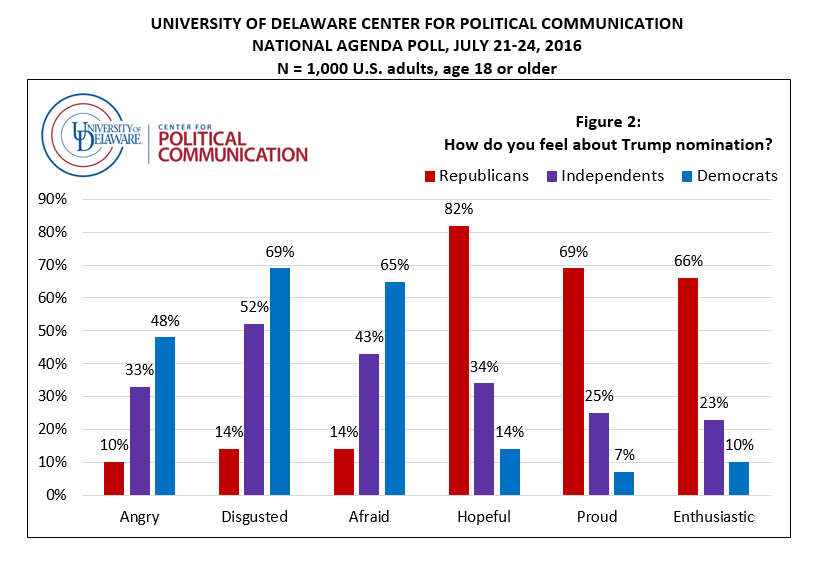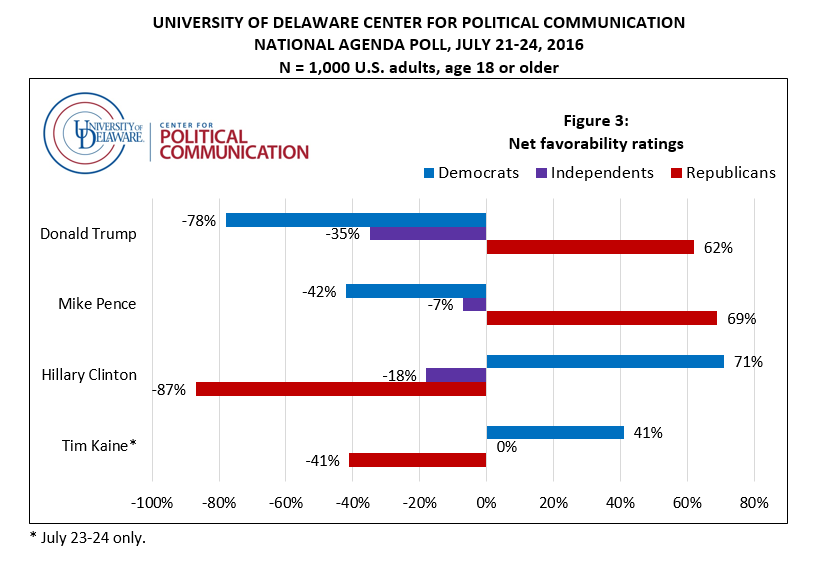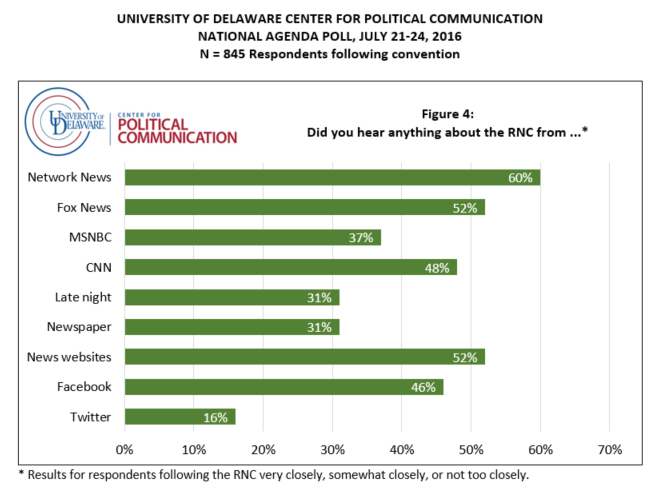National survey public opinion on Clinton and Trump : National survey shows snapshot of campaign after RNC
Among registered voters, Clinton at 46 percent and Trump at 42 percent

July 25, 2016 — A new University of Delaware Center for Political Communication survey finds that 46% of registered voters would vote for Democratic candidate Hillary Clinton and 42% would vote for Republican candidate Donald Trump, if the presidential election were being held today. The nationally representative telephone survey, conducted on July 21-24, 2016, interviewed 1,000 adult U.S. respondents by landline and cell phone, including 818 registered voters.
Almost half of all respondents (47%) say they feel “disgusted” about the Republican Party’s nomination of Trump. This is the most common feeling about Trump’s nomination, followed by “afraid” (42%), “hopeful” (40%), “proud” (31%), “angry” (31%), and “enthusiastic” (30%). Among Republicans, 82% feel hopeful and 69% feel proud, versus only 14% who feel disgusted or afraid. Meanwhile, 69% of Democrats feel disgusted and 65% feel afraid, whereas only 14% feel hopeful and 7% feel proud.
Feelings about the Trump nomination

Most Trump and Clinton supporters would be very disappointed if their candidate lost. Among those saying they would vote for Trump, 70% would very disappointed and another 17% would be somewhat disappointed. Among Clinton voters, 67% would be very disappointed and 19% would be somewhat disappointed.
Among all those surveyed, 59% have an unfavorable opinion of Trump (with 43% saying very unfavorable and 16% saying mostly unfavorable), compared to 37% who have a favorable opinion (18% very/19% mostly). Republican vice presidential nominee Mike Pence fares better, with 40% viewing him favorably (19% very/21% mostly) and 37% viewing him unfavorably (21% very/16% mostly).
Opinions about candidates

On the Democratic side, 51% have an unfavorable opinion of Clinton (36% very/15% mostly) versus 43% who view her favorably (19% very/24% mostly). Of the respondents interviewed on July 23-24 (N = 506), 37% have a favorable opinion of Democratic vice presidential nominee Tim Kaine (12% very/25% mostly) and 31% view him unfavorably (18% very/13% mostly).
Opinions split sharply across party lines for all four candidates, particularly Trump and Clinton. Among Republicans, 80% view Trump favorably and only 18% view him unfavorably. In contrast, 93% of Republicans have an unfavorable opinion of Clinton, with only 6% holding a favorable opinion. Of the Democrats surveyed, 9% view Trump favorably, whereas 87% view him unfavorably. Meanwhile, 83% of Democrats view Clinton favorably versus 12% who view her unfavorably. Independents rate Pence, Clinton, and (especially) Trump more negatively than positively, but split evenly on Kaine.
Hearing about the convention

Around a quarter of respondents (26%) say they followed the Republican National Convention very closely and 34% followed it somewhat closely, with 19% following it not very closely and 20% not following it at all.
Of the respondents following the convention (N = 845), almost half (46%) say they heard something about it on Facebook. Only 16% say they heard something about the convention from Twitter.
Almost two-thirds of those surveyed (64%) could correctly identify Cleveland as the city hosting the Republican National Convention. Around four in ten (41%) knew that Governor John Kasich did not attend the convention. Only around a quarter (24%) could correctly identify actor Scott Baio as a convention speaker.
About the study
The National Agenda Opinion Project research was funded by the University of Delaware’s Center for Political Communication (CPC) and the William P. Frank Foundation. The study was supervised by the CPC’s Director, Paul Brewer, a professor in the Departments of Communication and Political Science & International Relations.
Results are based on telephone interviews with a representative national sample of 1,000 adult U.S. residents. Telephone interviews were conducted by landline (500) and cell phone (500, including 278 without a landline phone). The survey was conducted from July 21-24, 2016, by Princeton Survey Research Associates International. The survey included one day of interviews conducted before Trump’s nomination acceptance speech and two days of interviews conducted after Clinton announced her selection of Tim Kaine as her vice presidential running mate. Statistical results are weighted to correct known demographic discrepancies. The margin of sampling error for the complete set of weighted data is – 4.0 percentage points.
Readers should be aware that in addition to sampling error, question wording and practical difficulties in conducting surveys can introduce error or bias into the findings of public opinion polls.
Please contact Paul Brewer at (302) 831-7771 for more details about the survey’s methodology.
